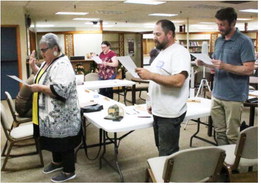Professor To Study Sleep’s Effects on Children’s Mental Health
A Montana State University psychologist is embarking on a study to determine whether common sleep habits of preadolescent children contribute to later psychiatric disorders, such as substance abuse and depression.
Cara Palmer, associate professor in the Department of Psychology in the College of Letters and Science and director of MSU’s Sleep and Development Laboratory, was awarded $3.3 million by the National Institutes of Health to conduct the five-year study to determine whether certain sleep patterns contribute to emotional and social difficulties in children.
“My questions have been motivated by other research that has found children who have sleep problems, especially chronic sleep problems, are much more likely to go on to develop issues like depression and anxiety,” said Palmer.
She added that while studies of adults and older teenagers show a link between inadequate sleep, impaired emotional responses and difficulty with social relationships, little data exist about similar links in younger age groups.
“Our goal is to look at these types of relationships in younger kids, right when we start to see a lot of them develop sleep problems and right before we see increased risk for mental health around the transition to middle school and high school,” Palmer said.
Over a period of years, Palmer and a team of graduate and undergraduate students will evaluate youth between the ages of 8 and 12. One study will track the children’s sleep patterns and emotional and social experiences over a year. Participants in the second experiment will spend five nights at the sleep lab with a friend, while researchers assess how their sleep quality affects their short-term mental health and social interactions.
For both studies, the researchers will evaluate how sleep affects children’s social interactions and the way that they process and respond to rewarding situations. Early behaviors, such as responding to positive situations too much or too little, have been linked with the development of later psychiatric disorders. They also will assess the effects of a common sleep pattern adopted by children and adolescents: not sleeping enough during the week and then sleeping in on weekends. Determining whether the weekend “recovery sleep” is helpful or harmful may be useful for families whose children struggle with a mismatch between their school schedules and sleep, Palmer said.
“The primary purpose of the study is to try to figure out what exactly are the effects of these different sleep patterns, with the goal of potentially understanding more about recommendations we should be giving parents of kids that age,” Palmer said.
While Palmer noted there is some research on adolescent sleep, there is far less on children’s sleep. “If you have a kid who isn’t getting enough sleep during the week, what do you do when they get that opportunity to sleep over the weekend? That’s one potential avenue where we could gain some insight.”
The researchers also will investigate the role of rapid eye movement, or REM, sleep to see if it plays as significant a role in children’s emotional experiences and it does for adults.
For more information about participating in the study, contact Palmer at cara. palmer@montana.edu.


